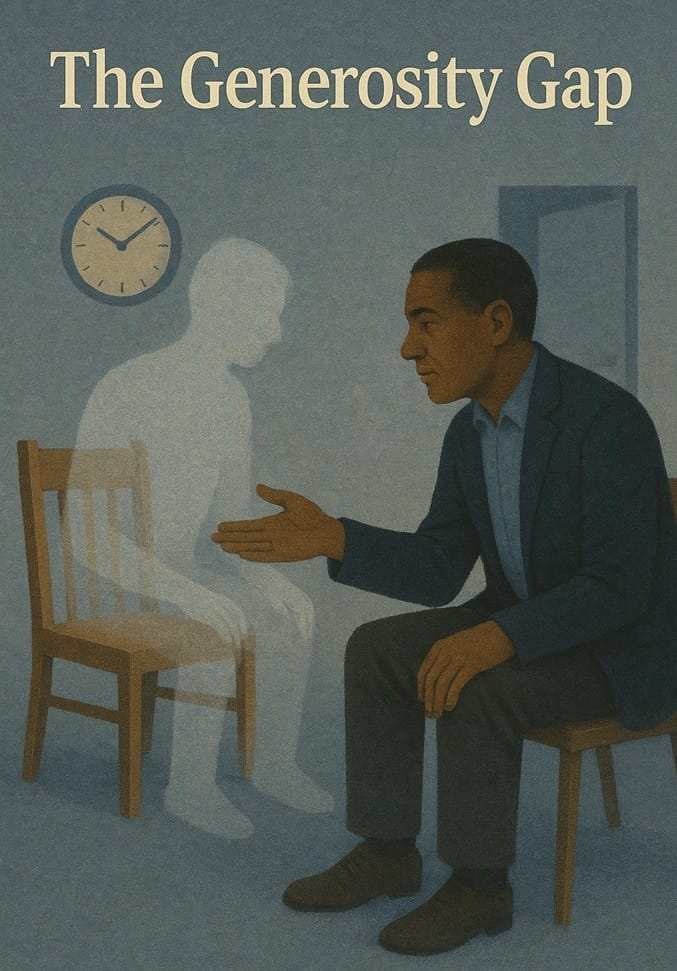
Why Pro-Bono Coaching Often Gets Ghosted,
and What We Can Do About It.
A Strange Disconnection
In the coaching and consulting world, offering pro-bono work is often seen as a generous, ethical, and heart-centered act. We do it to give back, to support those who may not yet have the financial means, or simply to pay forward the guidance we once received ourselves.
And yet, a growing number of seasoned professionals are sharing a perplexing experience: when they offer their highest-quality work for free, they’re often ignored, ghosted, or disengaged by the very people they set out to serve.
This isn’t about flakiness or disrespect. It’s about values, clarity, and the curious psychology of how we treat what’s freely given.
Let’s unpack this phenomenon, and consider how we, as coaches, consultants, and service-minded leaders, can transform it into something better.
The Pro-Bono Paradox: When Free Means Forgotten
Here’s the hard truth: People often don’t value what they haven’t invested in.
When a client pays you a full fee, they show up prepared. They reschedule respectfully. They follow through on action items. Why? Because they’ve bought in, not just financially, but psychologically.
But when that same service is offered for free?
- Emails go unanswered.
- Sessions are missed or casually rescheduled.
- Follow-through on goals fades fast.
- Coaches feel disrespected, and clients feel… surprisingly disconnected.
This is not always about bad behavior. It’s a natural side effect of how our culture teaches us to associate value with price, and it exposes a deeper challenge we must face as professionals.
Generosity Without Structure = Devaluation
Generosity is beautiful. But generosity without structure is often misinterpreted as casual, optional, or even unimportant.
If there’s no clear boundary or agreement in place, the recipient may not realize the true value of what they’re receiving. And when the coach doesn’t assert that value, it often goes unrecognized.
This isn’t about ego or needing appreciation. It’s about honoring the value of time, attention, and expertise, on both sides of the exchange.
Three Truths About Value and Engagement
- We treat what we pay for with more seriousness.
Payment creates a psychological contract. It triggers commitment and activates follow-through. - Time and energy are currency, too.
When someone isn’t paying money, they need to “pay” in attention, engagement, respect, and effort. Without a sense of exchange, the relationship becomes unbalanced. - Coaching thrives in environments of shared responsibility.
When only one party is carrying the responsibility (often the coach), the growth process breaks down.
What Can We Do About It? A Values-Based Framework for Pro-Bono Work
Offering services pro-bono doesn’t mean offering them without value. Here’s how we, as coaches and consultants, can maintain integrity, impact, and mutual respect, even in free engagements:
1. Set Clear Expectations and Agreements
Don’t assume the value is obvious. Spell it out.
- Share the actual value of your time.
- Outline what commitment looks like on both sides.
- Treat it like a professional engagement, with scheduling protocols, session goals, and check-ins.
“While there’s no financial cost, this work carries deep value, and I ask that you treat it as you would any high-stakes, high-return opportunity.”
2. Ask for Meaningful Reciprocity
If not money, then what?
- A testimonial or case study.
- A referral to others who might benefit.
- A donation to a charity of their choice.
- Volunteer hours given in return.
- A commitment to “pay it forward” to someone else.
This restores balance and accountability to the exchange.
3. Be Selective—and Intuitive
Not everyone is ready for pro-bono work. Be discerning.
- Choose people who are eager, engaged, and ready to do the work.
- Trust your intuition. If you sense a lack of commitment early, protect your energy.
Free doesn’t mean open to everyone. It means offered with intention.
4. Normalize Boundaries and Accountability
Being generous doesn’t mean being boundless. Set, and keep, your boundaries.
- Missed session? Set consequences.
- Late or unresponsive? Address it directly.
- Feeling drained? Re-evaluate the relationship.
You’re modeling what responsible coaching looks like. That alone is a powerful teaching.
What This Teaches Clients (And Us)
For the client, when done well, a pro-bono engagement can:
- Model professional standards and respect.
- Reveal their own values around commitment and self-worth.
- Serve as a wake-up call about honoring opportunities.
For us as coaches, these experiences help us refine:
- Who we want to serve.
- How we uphold our own value.
- What generosity with integrity really looks like.
To Wrap Up: Let’s Lead with Value and Clarity
Pro-bono work, when done with boundaries and purpose, can be a sacred, powerful exchange. But when generosity is confused with casualness, it gets lost, and so do the lessons it could offer.
Let’s shift the narrative. Let’s treat our free offerings with the same reverence we give to paid engagements, and invite those we serve to do the same.
Because ultimately, it’s not about the price, it’s about the presence, purpose, and principles we bring to every coaching conversation.
Let’s Keep Talking!
Peter ComrieCo-Founder and Human Capital Specialist at Full Spectrum Leadership Inc.
Reach out to me at peter@fullspectrumleadership.com
Or connect with me here to book a call!
Reach me on Linkedin; https://www.linkedin.com/in/petercomrie/
We can also chat on Bluesky: @petercomrie.bsky.social


